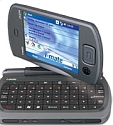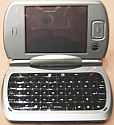Another HTC PDA/phone boots Linux
Mar 3, 2006 — by LinuxDevices Staff — from the LinuxDevices Archive — 8 views A PDA-like Windows Mobile phone has been successfully coaxed into running Linux. The “Universal,” created by Taiwanese ODM HTC and re-sold under various brands, has successfully booted several Linux OSes, after a flurry of collaboration on a developer community forum.
A PDA-like Windows Mobile phone has been successfully coaxed into running Linux. The “Universal,” created by Taiwanese ODM HTC and re-sold under various brands, has successfully booted several Linux OSes, after a flurry of collaboration on a developer community forum.

 |
(Click to enlarge) |
The Universal arrived last May, billed as the first 3G phone based on Windows Mobile 5.0. The device, which is based on a 520 MHz PXA27x processor with 64 MB SDRAM and 128 MB Flash, has a unique, swiveling display that rotates 180 degrees to create a tablet-style PDA. Wireless features include WiFi, IrDA, Bluetooth, UMTS, WCDMA, and GPRS. It also boasts a 1.3 megapixel camera.
A thread devoted to porting Linux to the Universal appeared in late December at XDA-Developer, a site for users and developers of HTC's various PDA-like phone models.
Within a month or so, a working kernel had been created, along with a working driver for the pxafb framebuffer device. After that, drivers followed quickly for the SD card controller, usb gadget interface, touchscreen, keyboard, and so on. Forum members then proceeded to install a variety of Linux OSes, including Debian ARM Linux, Opie, and GPE/Familiar.
More details about porting Linux to the HTC Universal can be found in this XDA-developers thread, and on a progress page showing screenshots of Opie and Familiar/GPE running on the Universal.
For lots more information about the origins of the XDA-developer project, and reasons why people actually want to run Linux on HTC phones, don't miss this LinuxDevices.com guest editorial by Xanadux/XDA-developer contributor Luke Casson.
This article was originally published on LinuxDevices.com and has been donated to the open source community by QuinStreet Inc. Please visit LinuxToday.com for up-to-date news and articles about Linux and open source.